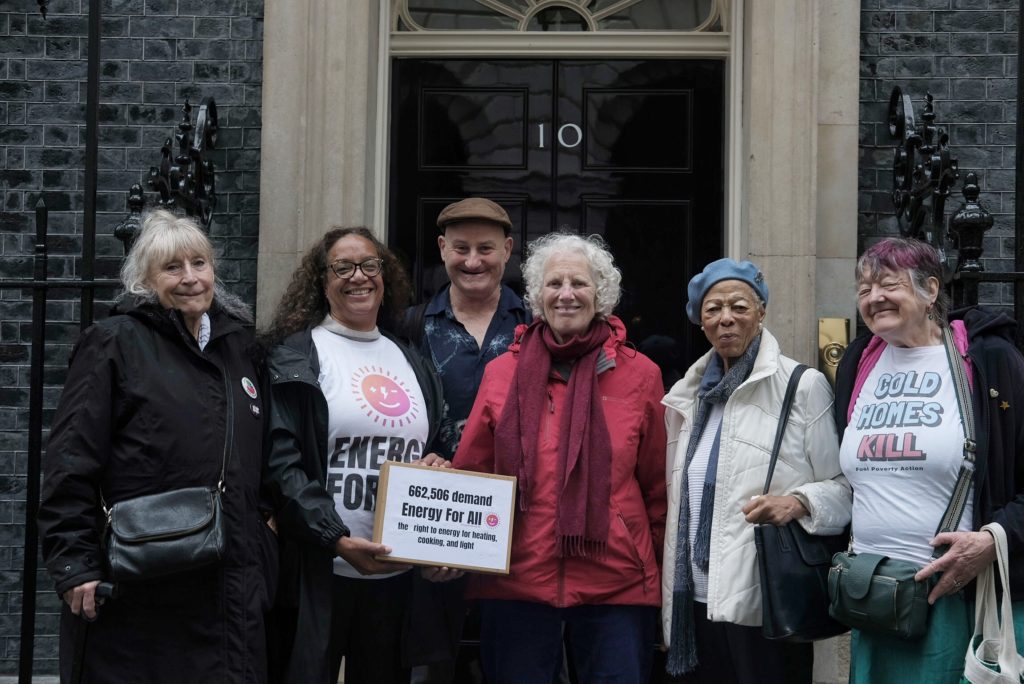
On October 1st 2024, the day our energy bills went up AGAIN, we delivered the Energy For All petition, signed by over 662,500 of you, to the door of Number 10.
Meanwhile, Fuel Poverty Action members across the country went on the radio and social media to spread the word about Energy For All.
On this day, we also joined forces with Disabled People Against Cuts, 350.org, the National Pensioners Convention and others to send a message that Cold Homes Kill, dropping banners over Westminster Bridge.
Rising prices will cause many to switch off their heating and risk serious health problems. Ofgem’s energy price cap will see bills rise another 10%, making them 65% higher than in 2020.
Jonathan Bean of Fuel Poverty Action says “this is extra money people can ill afford – especially the millions of low-income pensioners who will be plunged into fuel poverty as a result of Rachel Reeves axing winter fuel payments for two million pensioners who are already struggling”.
“A huge number of people will resort to turning off the heating and trying to survive in cold, damp homes. Many will end up in hospital, and thousands will die.”
The World Health Organisation recommends indoor temperatures are kept between 18 and 21°C at a minimum. Labour’s own research suggests that around 4,000 people could die as a result of the winter fuel payment cut alone.
Consultant Geriatrician Chris Hay, who is backing Energy For All, is concerned about how his patients will cope this winter.
“I’ve had patients coming in wearing five layers of clothes. Many struggle to navigate the complicated benefits system and are slipping through the cracks.
“I am concerned about their health and wellbeing as bills rise yet again. The government needs to act.
“There are protections in place to make sure that the water coming through our taps won’t make us ill. We need support in place to make sure everyone has enough energy for the heating they need to stay healthy.”
The idea of a universal basic energy allowance behind Fuel Poverty Action’s petition has huge public support and is backed by several groups campaigning for protections for pensioners this winter.
Jan Shortt, General Secretary of the National Pensioners Convention, said: “Energy For All would mean that older people would have a level of energy for warmth, light, hot water and cooking without worrying about falling into debt.”
The petition calls for “proper taxation on the profits of oil and gas producers, traders and suppliers” and an end to “fossil fuel subsidies” of “millions of pounds every day”.
Tommy Vickerstaff at 350.org says: “Our energy system is broken, and the government is dithering on fixing it. It’s currently focussed on lining the pockets of fossil fuel CEOs, but the solutions are clear.
“We need an immediate extreme wealth tax to unlock millions of pounds for a renewable energy system to ensure everyone in the UK is guaranteed clean, reliable energy in our homes. In doing so we can both provide security and safety for UK households as well as advancing our international climate goals by minimising the impact the UK energy system has on communities around the world and on our planet.”
Mel Kee, Head of Campaigns at Green New Deal Rising, says: “Our energy system must be run for the good of our communities, rather than to line the pockets of shareholders. Being able to heat our homes, or cook our meals should not be a luxury – these are basic needs.
“This Government must show us they are serious about ‘change’ by improving ordinary people’s lives, not protecting energy giants’ profits.”
Campaigners point to British Gas profits of over £750 million in 2023, and say Ofgem has “no excuse” for inaction to protect bill payers.
“Ofgem gave British Gas an extra £500 million in profits last year. So where is the action from the regulator to protect the most vulnerable?” asks Jonathan Bean of Fuel Poverty Action.
“One thing they can do right now is to abolish cruel standing charges, which see people up and down the country pay a charge just for the privilege of purchasing energy.
“Imagine being asked for £6 each time just to enter the supermarket to do your weekly shop. Standing charges are inhumane.”
The winter fuel payment was used by many pensioners to offset the high standing charges they face. With this protection gone standing charges may force many more to turn off their heating, and millions on prepayment meters risk being cut off completely.
Fuel Poverty Action also highlights that Ofgem electricity prices are four times higher than gas prices. This exposes the 8% of households with only electric heating to higher bills, including older people with only storage heating and families in low-quality private rented homes.
We are calling for removal of unfair government levies, and market reform, so households benefit from cheap renewables.
“The terrible human suffering and devastating impact on our NHS we will see this winter results from misguided government policy and energy firm profiteering”, says Bean.
“We should instead be protecting everyone with Energy For All to keep us all warm and safe this winter.”
You can read more about the Energy For All petition hand-in in The Canary and share our posts on X, Facebook and Instagram.
Fuel Poverty Action continues to put huge pressure on the government to listen and act to prevent deaths.
Next, we are heading to the House of Commons to talk directly to MPs about Energy For All. To help us get a good attendance, please click here to send your MP the pre-written invitation.

